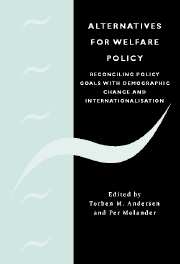Book contents
- Frontmatter
- Contents
- List of contributors
- Preface
- 1 Introduction
- 2 International integration and the welfare state
- 3 The changing age structure and the public sector
- 4 Emigration from the Scandinavian welfare states
- 5 Productivity and costs in public production of services
- 6 Use of fees in the provision of public services in OECD countries
- 7 Privatisation of social insurance with reference to Sweden
- 8 Occupational welfare
- 9 Pathways to retirement and retirement incentives in Sweden
- 10 Social insurance and redistribution
- 11 Assessing the effect of introducing welfare accounts in Sweden
- 12 Taxation in a global economy
- 13 Taxation and education investment in the tertiary sector
- 14 Debt strategies for Sweden and Europe
- 15 Policy options for reforming the welfare state
- Index
- References
8 - Occupational welfare
Published online by Cambridge University Press: 22 September 2009
- Frontmatter
- Contents
- List of contributors
- Preface
- 1 Introduction
- 2 International integration and the welfare state
- 3 The changing age structure and the public sector
- 4 Emigration from the Scandinavian welfare states
- 5 Productivity and costs in public production of services
- 6 Use of fees in the provision of public services in OECD countries
- 7 Privatisation of social insurance with reference to Sweden
- 8 Occupational welfare
- 9 Pathways to retirement and retirement incentives in Sweden
- 10 Social insurance and redistribution
- 11 Assessing the effect of introducing welfare accounts in Sweden
- 12 Taxation in a global economy
- 13 Taxation and education investment in the tertiary sector
- 14 Debt strategies for Sweden and Europe
- 15 Policy options for reforming the welfare state
- Index
- References
Summary
Alternative and supplement
Several studies indicate that occupational and private welfare can be a substitute for or supplement to social welfare. In Forssell et al. (1999), social insurance transfers to older people are compared with non-state employment-related (occupational) transfers in eight European countries (Denmark, Finland, France, Germany, the Netherlands, Norway, Sweden and the UK). Denmark and the Netherlands have social insurance pension schemes that bear no relation to earnings at all, and in the UK social insurance pensions are only weakly related to earnings. These are the countries in the study with the most comprehensive occupational pensions. Germany and France, with state pension schemes based on the corporate model, provide good standard protection with high rates of replacement even for those who have had high salaries. Non-state employment-related pensions are less important in France and Germany than in the other countries in the study. A comparison of the Nordic countries shows a varied choice of solutions to the problem of providing for old age in spite of the fact that they are similar in many respects. All have a basic provision given to everyone irrespective of income. Finland, Norway and Sweden, but not Denmark, have national supplementary pensions based on the principle of compensation for loss of income. However, as the replacement rate is higher in Finland than in the other Nordic countries, there is little scope there for occupational pensions, which are most comprehensive in Denmark.
- Type
- Chapter
- Information
- Alternatives for Welfare PolicyCoping with Internationalisation and Demographic Change, pp. 189 - 206Publisher: Cambridge University PressPrint publication year: 2003
References
- 4
- Cited by



